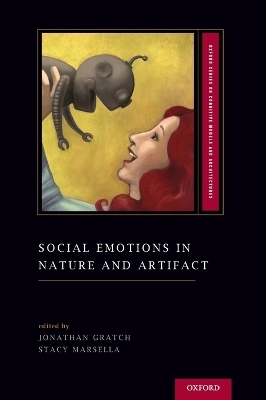
Social Emotions in Nature and Artifact
Oxford University Press Inc (Verlag)
978-0-19-538764-3 (ISBN)
Recent years have seen the rise of a remarkable partnership between the social and computational sciences on the phenomena of emotions. Rallying around the term Affective Computing, this research can be seen as revival of the cognitive science revolution, albeit garbed in the cloak of affect, rather than cognition. Traditional cognitive science research, to the extent it considered emotion at all, cases it as at best a heuristic but more commonly a harmful bias to cognition. More recent scholarship in the social sciences has upended this view.
Increasingly, emotions are viewed as a form of information processing that serves a functional role in human cognition and social interactions. Emotions shape social motives and communicate important information to social partners. When communicating face-to-face, people can rapidly detect nonverbal affective cues, make inferences about the other party's mental state, and respond in ways that co-construct an emotional trajectory between participants. Recent advances in biometrics and artificial intelligence are allowing computer systems to engage in this nonverbal dance, on the one hand opening a wealth of possibilities for human-machine systems, and on the other, creating powerful new tools for behavioral science research.
Social Emotions in Nature and Artifact reports on the state-of-the-art in both social science theory and computational methods, and illustrates how these two fields, together, can both facilitate practical computer/robotic applications and illuminate human social processes.
JG: Associate Director for Virtual Humans Research, University of Southern California, Institute for Creative Technologies, Research Associate Professor, Department of Computer Science and co-director, USC Computational Emotion GroupSM: Project Leader, University of Southern California, Information Sciences Institute, Research Associate Professor of Computer Science, University of Southern California
Contributors ; Introduction ; Jonathan Gratch & Stacy Marsella ; 1 ; On the Sociality of Emotion-Eliciting Appraisals: Two Aspects ; Craig A. Smith & Leslie D. Kirby ; 2 ; Processes of Emotional Meaning and Response Coordination ; Brian Parkinson ; 3 ; Challenge, Threat and Social Influence in Digital Immersive Virtual Environments ; Jim Blascovich ; 4 ; Requirements for a process model of appraisal from a social functional perspective ; Stacy Marsella, Jonathan Gratch ; 5 ; Modeling Theory of Mind and Cognitive Appraisal with Decision-Theoretic Agents ; David V. Pynadath, Mei Si, & Stacy C. Marsella ; 6 ; Automatic Facial Expression Recognition ; Jacob Whitehill, Marian Stewart Bartlett, & Javier R. Movellan ; 7 ; Toward effective automatic recognition systems of emotion in speech ; Carlos Busso, Murtaza Bulut, & Shrikanth Narayanan ; 8 ; The Role of Context in Affective Behavior Understanding ; Louis-Philippe Morency ; 9 ; Computational Models of Expressive Behaviors for a Virtual Agent ; Rados?aw Niewiadomski, Sylwia Julia Hyniewska, & Catherine Pelachaud ; 10 ; Early Emotional Communication: Novel Approaches to Interaction ; Daniel S. Messinger, Mohammad H.Mahoor, Sy-Miin Chow, J. D. Haltigan, StevenCadavid, & Jeffrey F. Cohn ; 11 ; Using social agents to explore theories of rapport and emotional resonance ; Jonathan Gratch, Sin-Hwa Kang, & Ning Wang
| Erscheint lt. Verlag | 9.1.2014 |
|---|---|
| Reihe/Serie | Oxford Series on Cognitive Models and Architectures |
| Verlagsort | New York |
| Sprache | englisch |
| Maße | 257 x 180 mm |
| Gewicht | 635 g |
| Themenwelt | Geisteswissenschaften ► Psychologie ► Sozialpsychologie |
| Geisteswissenschaften ► Psychologie ► Verhaltenstherapie | |
| Naturwissenschaften ► Biologie ► Humanbiologie | |
| Naturwissenschaften ► Biologie ► Zoologie | |
| ISBN-10 | 0-19-538764-3 / 0195387643 |
| ISBN-13 | 978-0-19-538764-3 / 9780195387643 |
| Zustand | Neuware |
| Informationen gemäß Produktsicherheitsverordnung (GPSR) | |
| Haben Sie eine Frage zum Produkt? |
aus dem Bereich


